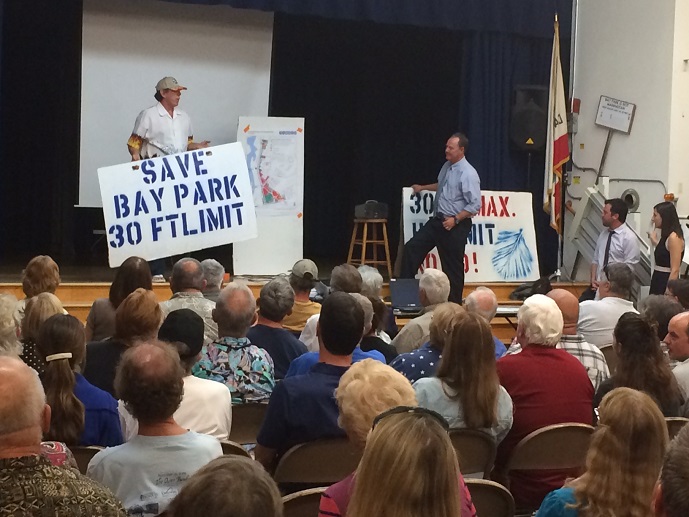Stop Calling Us NIMBYs
Posted By James LaMattery On
More than 300 Bay Park and Clairemont residents packed Bay Park Elementary in 2014 to oppose a city proposal to increase development in their neighborhood. / Photo by Andrew Keatts
NIMBY, the acronym for “not in my backyard,” has become a pejorative accepted into the cannon of elite planning professionals and government housing agency documents as a touchstone of all that’s gone wrong in development permit approvals. It is an unfair characterization of anyone opposing development proposals located near them, and it’s offered regardless of whether the development proposed is good or bad.

San Diego County’s 2015 Regional Analysis of Impediments to Fair Housing Choice [1] describes NIMBYism as a “syndrome” that is:
widespread, deeply ingrained, easily translatable into political actions, and intentionally exclusionary and growth inhibiting. NIMBY sentiment can reflect concerns about property values, service levels, community ambiance, the environment, or public health and safety. It can also reflect racial or ethnic prejudice masquerading under the guise of a legitimate concern. NIMBYism can manifest itself as opposition to specific types of housing, as general opposition to changes in the community, or as opposition to any and all development.
Despite the city and county’s insistence in other planning manuals that community members should also feel encouraged to offer input, opposition is often dismissed under the moniker of NIMBY. To get around this opposition, California lawmakers briefly considered SB 827, which would have made building near transit stations easier [2] but would take local control away from local jurisdictions and force all to live with the prescription.
Since the 1960s and the rise of the city’s 52 community planning groups, which make recommendations about proposed developments, it’s been a tradition to include public participation in the process. It is, after all, their future community, so residents should have a say in the planning as “stakeholders.”
As a term, “stakeholders” is a more adequate description of the community members involved in those discussions, who might have the largest actual stake in the outcome of a project. The city’s use of the term in their community plan preparation manual [3] ostensibly sets the tone for what they want from the citizenry.
That said, regardless of the local project being proposed these days, the discourse quickly becomes a larger dialogue about our statewide housing crisis. This is an important debate, but it should be a fair fight if we want to maintain any hope of solving it.
It may be difficult for officials, planners and architects to deal with residents who don’t believe building luxury apartment towers [4] will solve our lack of housing, or that housing the chronically homeless [5] in the neighborhood without providing them full health care services could be a recipe for disaster. But these are just some of larger issues that need to be mitigated when approving new developments and projects.
NIMBY is a convenient label if your goal is to ignore pushback from residents on development proposals. But these residents are the first to push back precisely because they are located nearest the proposal and must live with it, good or bad.
Residents are neither sick nor diseased, as the county housing report suggested, because they are concerned about impacts to public services, insufficient infrastructure, environment and public health and safety. YIMBY, the acronym for “yes in my backyard,” was coined in contrast [6] to the “NIMBY syndrome.” YIMBY with its “Y” or “yes” connotes a positive. To frame debates over project approvals with the over-simplification of “yes” or “no” doesn’t help to reach solutions that are much more complex.
The debate over a proposal does not need to descend into questions of racial prejudice, but the power of using NIMBY as a pejorative is that it can shut down conversation. Zoning and deed restrictions were, in the past, used to as a method to prevent minorities from purchasing property in all-white communities, a sick and disgusting practice. But using that awful history, in the county’s Impediments to Fair Housing Choice report, to condemn or pre-judge a neighborhood’s opposition to proposed development is unwarranted, unfair and discriminatory itself.
Look closer at community opposition to the many project proposals in San Diego and you will see legitimate concerns regarding public safety, not attempts to exclude a class of people from a neighborhood.
James LaMattery is a Realtor and resident of Bay Park.
No comments:
Post a Comment